Lifestyle Management With Christie Morrison
Chat with MASLD AI

Hi, I am MASLD AI.
Suggested Questions :

MASLD AI 08:27 PM

In this MASLD Community Network session, Christie Morrison, NP with Oshi Health and TDDC (GI Alliance), reviews a real patient case to highlight how lifestyle changes can help manage metabolic dysfunction–associated steatotic liver disease (MASLD) and MASH. She explains how non-invasive tests like FIB-4 scores and FibroScan results guide risk assessment, and why weight loss, healthy diet, and regular exercise are key to slowing or reversing liver damage. Using a culturally sensitive approach, Christie shows how to tailor recommendations for patients while addressing common risk factors such as obesity, diabetes, and high blood pressure. She also covers the role of calorie reduction, resistance training, and Mediterranean-style eating in improving liver health. This practical talk is designed for APPs, GI providers, and healthcare professionals looking for simple strategies to help patients prevent progression to fibrosis and cirrhosis.
Related Podcast
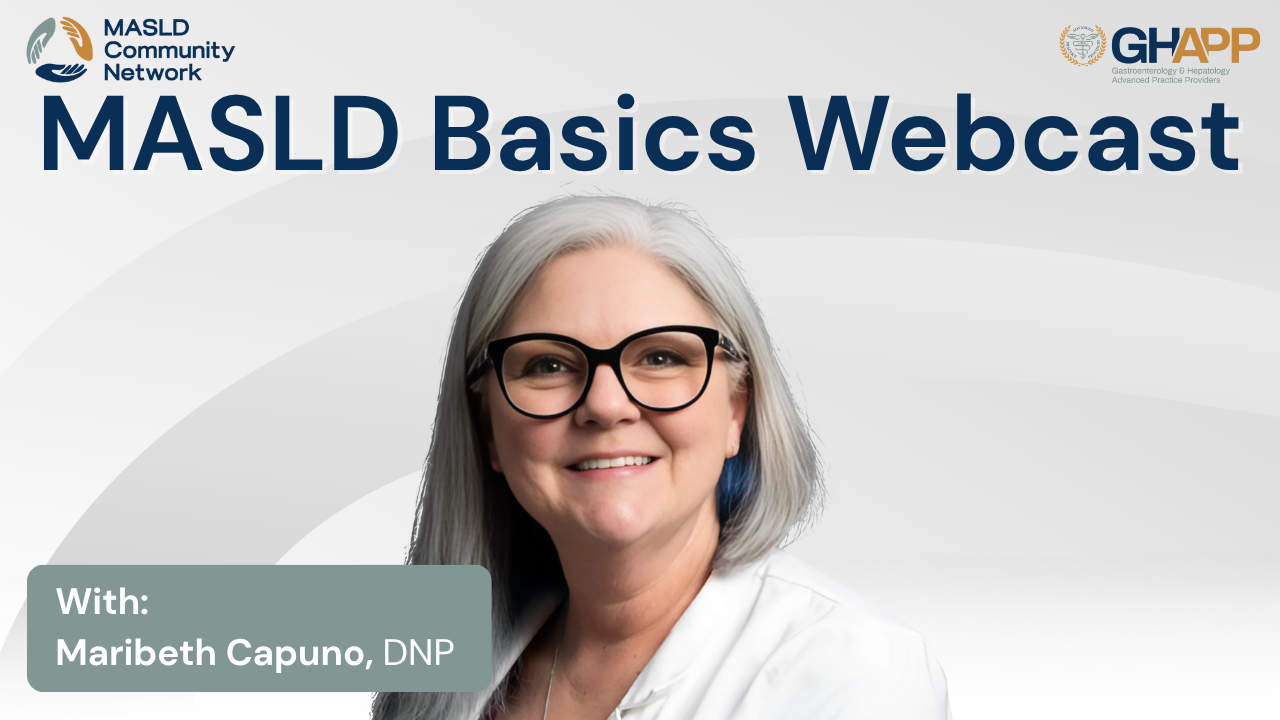
MASLD Basics With Maribeth Capuno

Join us for an in-depth overview of steatotic liver disease, presented through the GHAPP MASLD/MASH Community Network and proudly sponsored by Madrigal Pharmaceuticals. This engaging session walks through the updated terminology replacing NAFLD and NASH with MASLD (Metabolic Dysfunction-Associated Steatotic Liver Disease) and MASH (Metabolic Dysfunction-Associated Steatohepatitis)—explaining what the name change means and how to apply the latest AASLD 2023 guidelines in clinical practice. Learn how to identify MASLD based on cardiometabolic risk factors, rule out other causes of steatosis such as alcohol use, autoimmune conditions, and hereditary liver diseases, and determine when to use non-invasive testing like FIB-4, FibroScan, and ELF to stratify fibrosis risk. With Global Fatty Liver Day around the corner, this timely presentation also highlights the global burden of MASLD, its progression from steatosis to cirrhosis and HCC, and practical steps for primary care and hepatology teams to intervene early. You'll follow the case of JP, a 55-year-old with obesity, pre-diabetes, and elevated liver enzymes, as a real-world example of how to evaluate, diagnose, and manage MASLD—and when to refer to hepatology for advanced care. Whether you're a GI provider, APP, or primary care clinician, this talk offers a practical roadmap for managing fatty liver disease in 2025 and beyond.
Watch Now
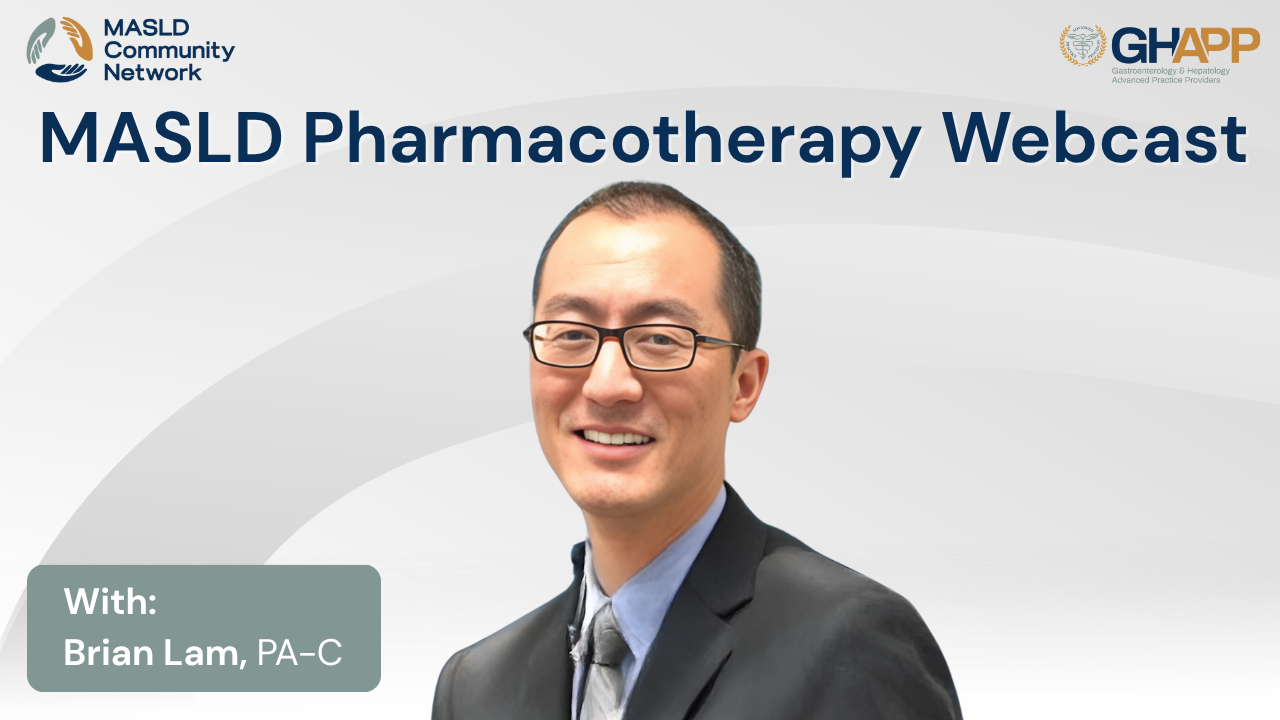
MASLD Pharmacotherapy With Brian Lam

Join Brian Lam, PA-C, Associate Medical Director of Research at INOVA and Chair of the Global NASH/MASH Council, for an insightful discussion on pharmacotherapy for MASLD (Metabolic Dysfunction–Associated Steatotic Liver Disease), also known as fatty liver disease. This episode, part of the GHAPP MASLD Community Network, explores the evolution of treatment options—including GLP-1 receptor agonists like semaglutide and tirzepatide, the antioxidant benefits of vitamin E, the metabolic impact of pioglitazone, and the targeted liver-specific mechanism of action of Resmetirom (a THR-β agonist). Learn how weight loss remains a foundational strategy for MASH management, but with FDA approval of new agents like Resmetirom in March 2024, we now have more tools to address hepatic inflammation and fibrosis directly. Brian also shares practical considerations around comorbidities, cardiovascular risk, statin use, and how to evaluate appropriate patients using non-invasive testing like transient elastography and MR elastography. Whether you're new to managing fatty liver or an experienced hepatology APP, this overview provides the latest guidance and clinical insight to improve patient outcomes in MASLD and MASH care.
Watch Now

Addressing Health Disparities: Equity Considerations in MASH/MASLD Care

In this episode, Patrick Horne, NP at the University of Florida (UF Health), explores the impact of health disparities and socioeconomic inequality on the diagnosis and management of MASH (metabolic-associated steatohepatitis) and MASLD (metabolic dysfunction-associated steatotic liver disease). With a focus on rural and underserved populations, Patrick discusses how limited access to quality healthcare, healthy food, exercise options, and non-invasive testing (NITs) like FibroScan or MRI elastography can delay diagnosis and worsen outcomes. He shares practical, empathetic strategies for individualizing care, such as using accessible tools like FIB-4 or APRI, promoting low-cost physical activity like walking or swimming, and providing culturally sensitive nutrition advice tailored to financial and geographic realities. Patrick emphasizes the provider’s role as a patient advocate and coach, helping patients navigate barriers and create sustainable lifestyle modifications. This episode offers key insights for clinicians working to close gaps in care and promote equity in liver disease management.
Watch Now
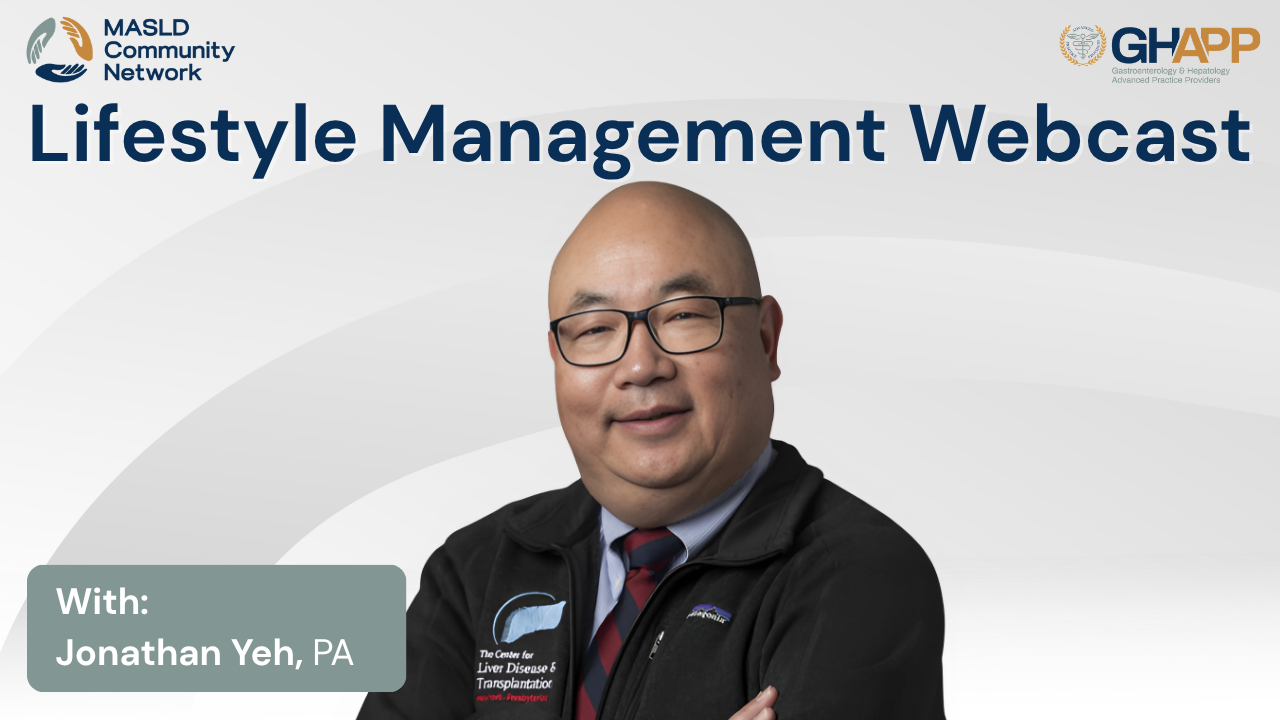
Lifestyle Management With Jonathan Yeh

In this GHAPP MASLD Community Network session, Jonathan Yeh, PA-C from Columbia University Irving Medical Center, presents a case-based discussion on the lifestyle management of MASLD (Metabolic Associated Steatotic Liver Disease) and MASH (Metabolic Associated Steatohepatitis). Through the case of a 65-year-old patient with obesity, type 2 diabetes, hypertension, and hyperlipidemia, Jonathan highlights how dietary modification, weight loss, and physical activity remain the foundation of treatment, even with new pharmacotherapies available. The presentation emphasizes the benefits of the Mediterranean diet, the importance of avoiding refined carbohydrates, and the role of both aerobic and resistance exercise in improving liver health, reducing steatosis, and potentially reversing fibrosis. Cultural considerations, patient adherence challenges, and strategies to drive behavior change are also addressed, providing clinicians with practical insights to support patients in preventing progression to advanced fibrosis or cirrhosis.
Watch Now

Addressing Health Disparities: Equity Considerations in MASH/MASLD Care

In this powerful and timely episode, Robin Soto, FNP at UC San Diego Health, explores the deep-rooted health disparities impacting patients with MASH (metabolic dysfunction-associated steatohepatitis) and MASLD (metabolic dysfunction-associated steatotic liver disease). With a focus on equity in liver care, Robin highlights the disproportionate burden of disease in Hispanic and underserved populations and the complex interplay of genetics, socioeconomic status, healthcare access, and systemic bias that drives these outcomes. She shares actionable strategies for advanced practice providers (APPs) to implement culturally sensitive communication, bias-conscious screening protocols using tools like FIB-4, NAFLD fibrosis score, and transient elastography, and how to leverage telehealth and community partnerships to bridge gaps in care. Robin also addresses the importance of culturally relevant dietary counseling, inclusive family engagement, and motivational interviewing to enhance adherence and improve long-term outcomes. Whether you're in primary care, hepatology, or community health, this episode offers a roadmap to advance health equity in the management of fatty liver disease.
Watch Now
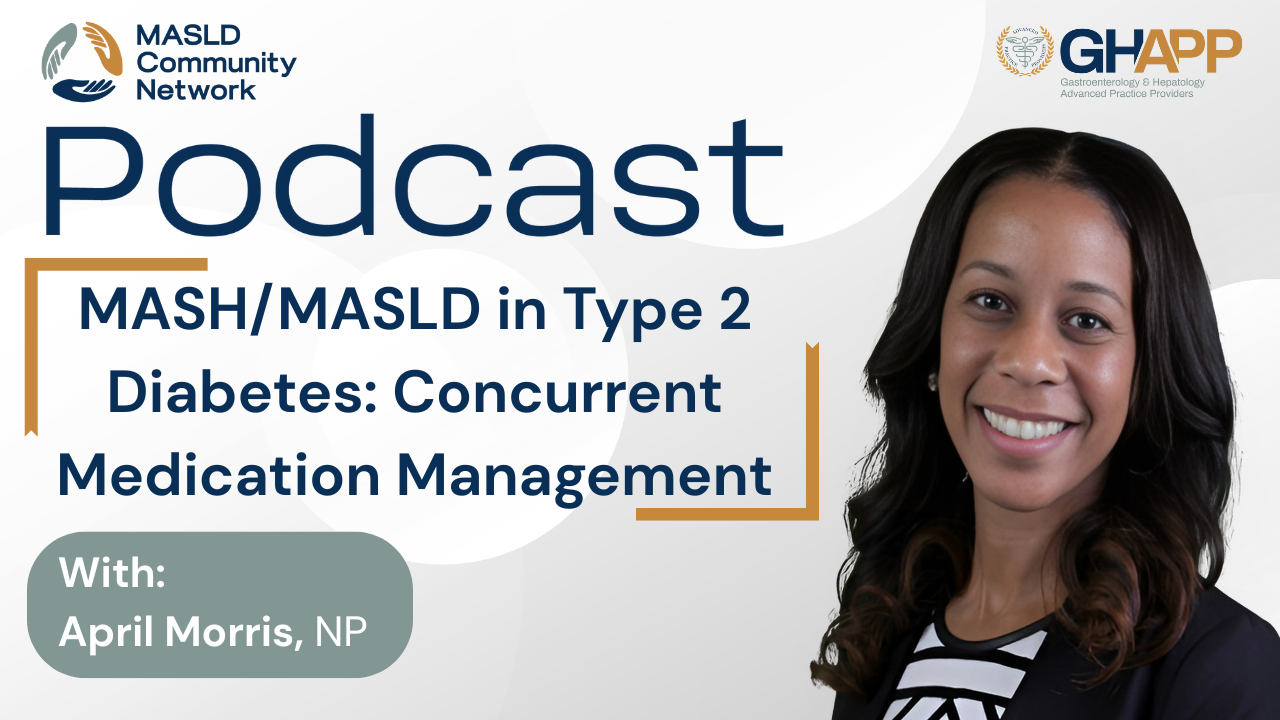
MASH/MASLD in Type 2 Diabetes: Concurrent Medication Management

In this video, April Morris, FNP, shares her expertise on the close connection between type 2 diabetes and fatty liver disease (MASLD/MASH). With over 16 years of experience in hepatology and endocrinology, she explains why patients with type 2 diabetes are at a higher risk of developing MASH due to shared risk factors like insulin resistance and obesity. April highlights how improving glycemic control, lowering A1C, weight loss, and lifestyle modifications can significantly reduce liver fat, inflammation, and fibrosis progression. She discusses the benefits of modern diabetes medications—including GLP-1 receptor agonists such as semaglutide and tirzepatide, SGLT2 inhibitors, and metformin—and how they not only improve blood sugar and weight management but also support liver, kidney, and heart health. Importantly, she notes that most diabetes medications remain safe for patients with liver disease unless advanced decompensated cirrhosis is present, where caution with metformin may be necessary due to lactic acidosis risk. April emphasizes that treating diabetes aggressively and reaching an A1C target around 7% can slow or even prevent progression of liver fibrosis. For APPs and providers, the takeaway is clear: effective diabetes management is one of the most powerful tools to improve liver outcomes.
Watch Now
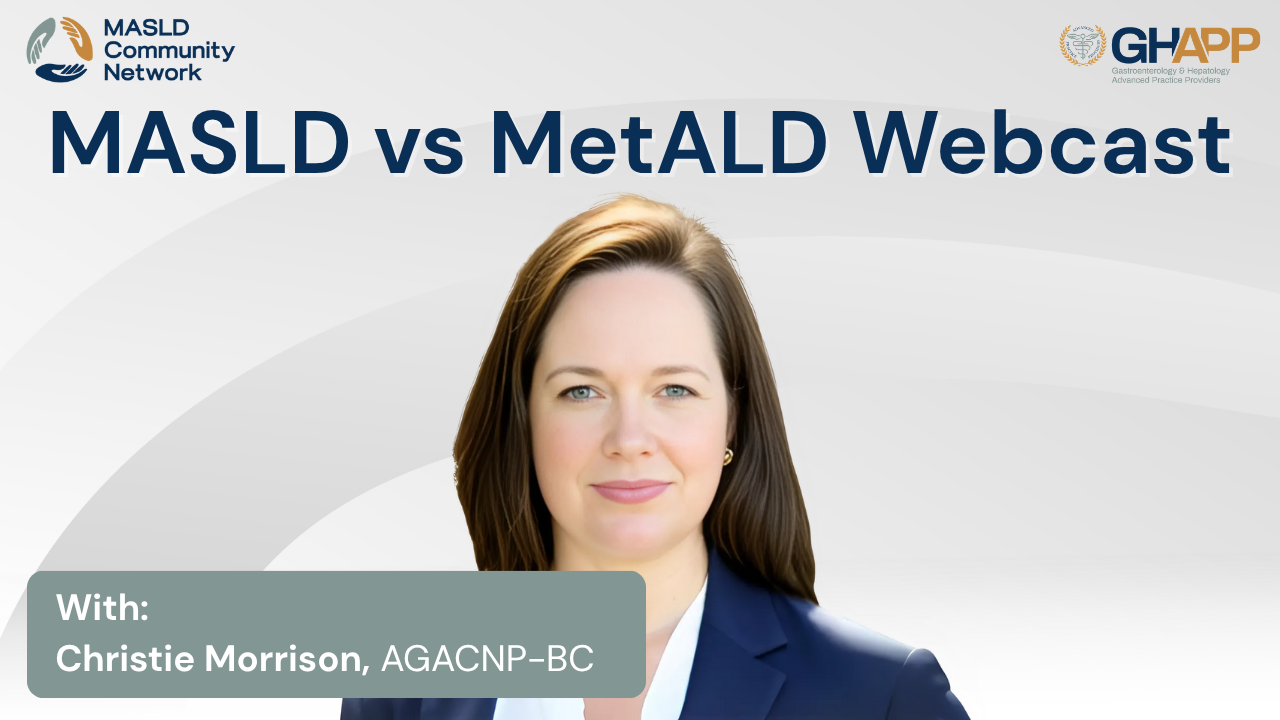
MASLD vs MetALD With Christie Morrison

In this MASLD Community Network session, Christie Morrison, NP, shares a practical case study to explain how to recognize and manage metabolic dysfunction–associated steatotic liver disease (MASLD), MASH, and mixed-etiology MET-ALD. She highlights how common risk factors like obesity, diabetes, high blood pressure, and regular alcohol use can overlap and accelerate liver damage. Christy also discusses how non-invasive testing helps stage disease, why accurate alcohol history is important, and what steps providers can take to support patients. Lifestyle changes such as adopting a healthier diet, increasing physical activity, losing weight, and reducing alcohol intake remain the foundation of care. This overview is designed for APPs and GI clinicians looking for clear, practical strategies to help patients prevent progression to advanced liver disease.
Watch Now
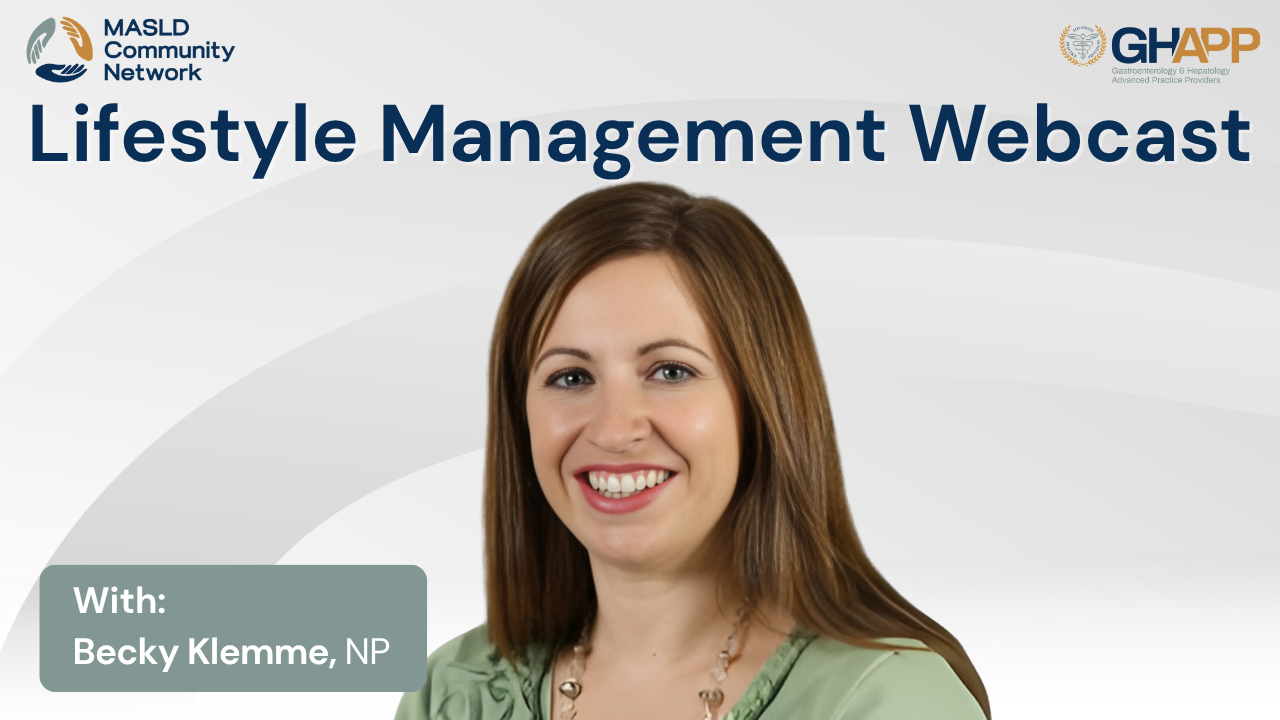
Lifestyle Management With Becky Klemme

In this educational session, Becky Klemme, NP from Sioux Falls, South Dakota, shares over a decade of hepatology experience to highlight lifestyle management for patients with Metabolic Dysfunction–Associated Steatotic Liver Disease (MASLD). Formerly known as NAFLD, MASLD is now the most common chronic liver disease worldwide, closely linked to obesity, type 2 diabetes, hypertension, and cardiovascular disease. Through a detailed patient case, Becky explains how to evaluate MASLD using labs, imaging, and non-invasive tests like FIB-4 and FibroScan, and how to distinguish between simple steatosis, steatohepatitis (MASH), and advanced fibrosis. She outlines practical strategies for dietary changes, exercise, weight loss goals, and metabolic risk reduction—all while keeping patient-centered, culturally sensitive care in mind. Viewers will also learn about the pathogenesis of MASLD and MASH, the role of genetics and lifestyle, and evidence-based approaches such as the Mediterranean diet, structured physical activity, behavioral counseling, and the 5A framework for patient engagement. With obesity and diabetes on the rise, early recognition and proactive lifestyle intervention are essential to preventing progression to cirrhosis, liver failure, or hepatocellular carcinoma (HCC). If you are a hepatology provider, APP, or clinician managing patients with fatty liver disease, this session offers actionable insights and patient care strategies you can use in practice.
Watch Now
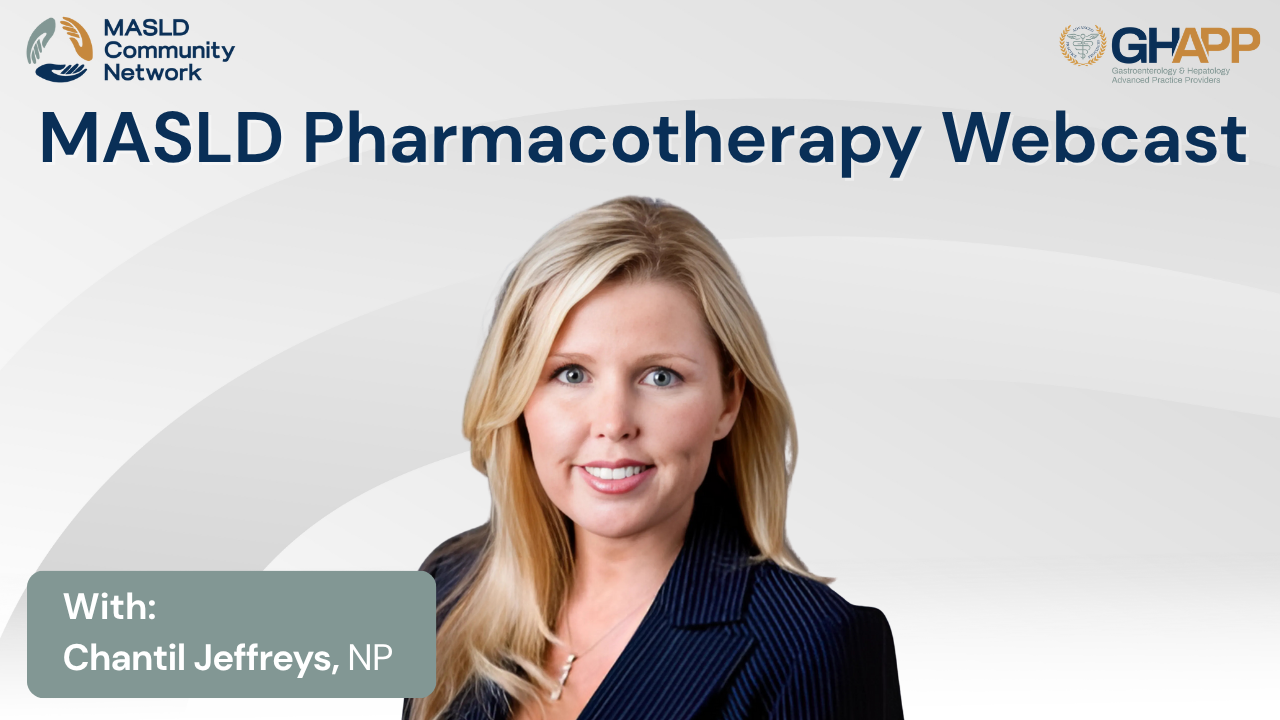
MASLD Pharmacotherapy With Chantil Jeffreys

In this MASLD Community Network webcast, Chantil Jeffreys, NP, walks through a practical framework for pharmacotherapy in MASLD/MASH—from lifestyle-first approaches to the evolving role of GLP-1 receptor agonists and bariatric/endoscopic options. She clarifies common misconceptions (e.g., statins are safe—and beneficial—for patients with fatty liver), reviews evidence and real-world considerations for vitamin E and pioglitazone, and explains where resmetirom (Rezdiffra) fits today for non-cirrhotic MASH with F2–F3 fibrosis—including monitoring, drug–drug interactions, and documentation tips that support payer approval. The session also covers cardiovascular risk reduction, peri-procedure guidance for GLP-1s, and practical strategies for staging and follow-up so clinicians can confidently personalize therapy and improve outcomes.
Watch Now
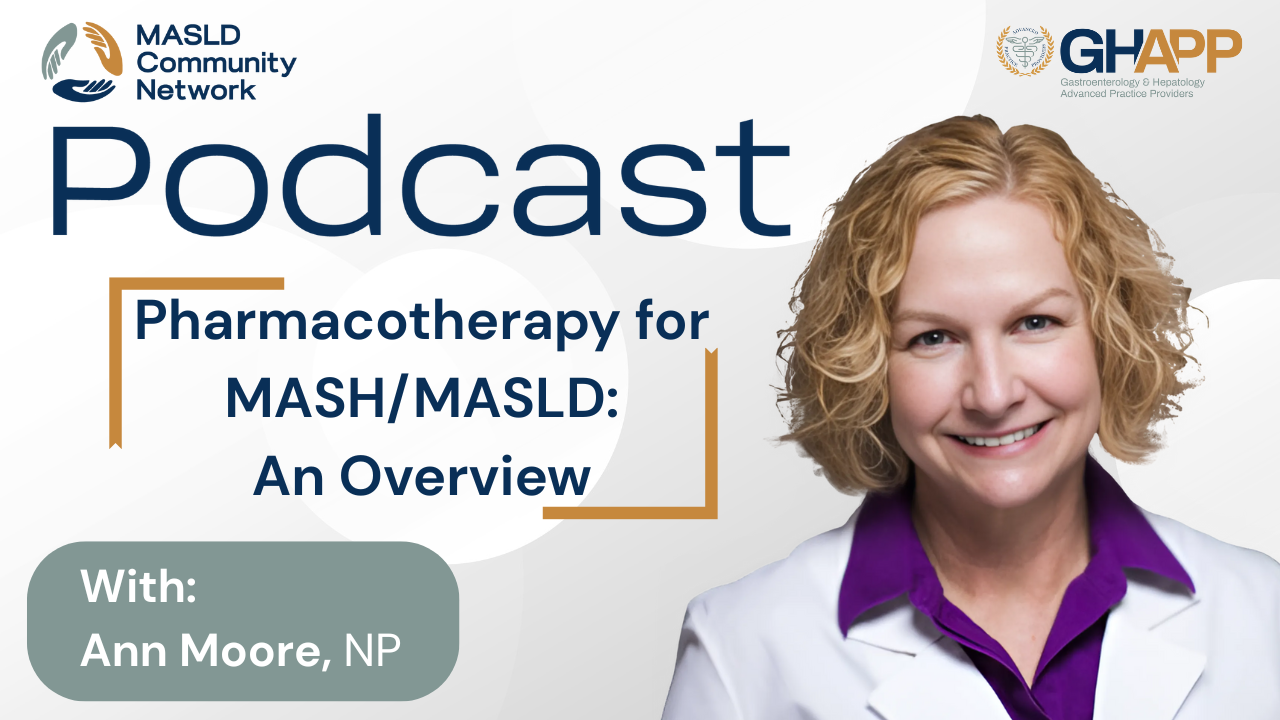
Pharmacotherapy for MASH/MASLD: An Overview

In this expert discussion, Anne Moore, NP with Arizona Liver Health in Phoenix, shares key insights into the evolving landscape of pharmacotherapy for MASH and MASLD. She explains the primary histological endpoints that matter most in clinical trials—MASH resolution and fibrosis improvement—and why these markers are critical for both regulatory approval and long-term patient outcomes. Anne highlights the approval of resmetirom, the first FDA-approved treatment for MASH with F2–F3 fibrosis, and reviews how it works as a selective THR-beta agonist to reduce liver fat and inflammation while improving fibrosis. Drawing on Phase 3 trial data, she outlines its efficacy, safety profile, and side effects, as well as strategies for monitoring patients through non-invasive testing, liver chemistries, and metabolic risk factors. This session also explores which patients are most appropriate candidates for MASH pharmacotherapy, with a focus on those at high risk of progression but still early enough in their disease to benefit. For advanced practice providers and hepatology specialists, this video provides a clear, practical roadmap to identifying, treating, and monitoring patients with MASH in everyday clinical practice.
Watch Now





 September 2025
September 2025 